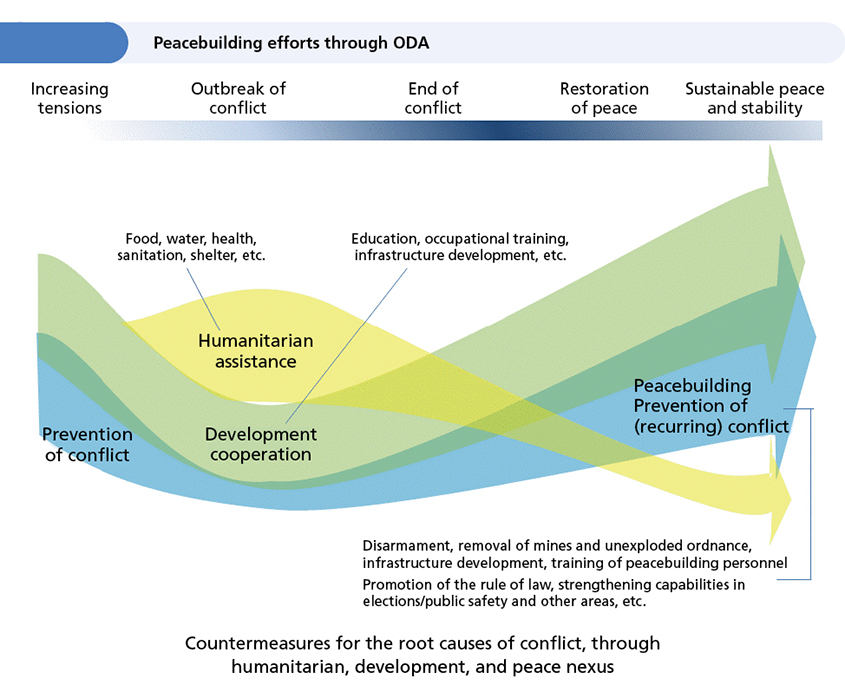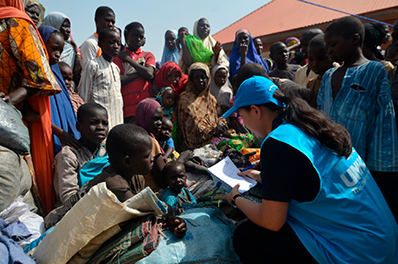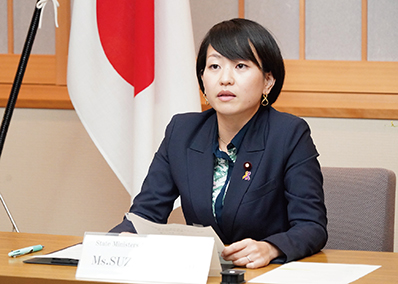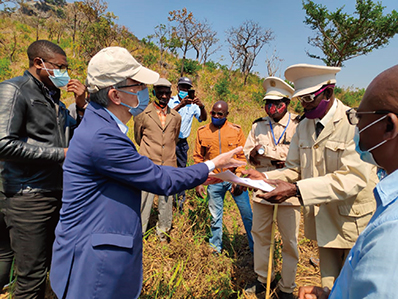2-2 Assistance for Ensuring Peace, Stability, and Security
(1) Support for Peacebuilding and Refugees/Displaced Persons
Regional and internal conflicts arising from various factors, including ethnic, religious, and historical differences, as well as from the effects of poverty, disparities and other such issues, still continue to arise in the international community. In particular, the prolongation of such conflicts has become a challenge in recent years. Such conflicts generate a great number of refugees and displaced persons, resulting in humanitarian crises. These conflicts also undermine the progress in development achieved through long-term efforts, and cause massive economic losses. Therefore, it is important for the entire international community to engage in peacebuilding for the establishment of foundations for development in order to prevent conflicts, avoid their recurrence, and consolidate sustainable peace.

● Japan’s Efforts

A UNHCR staff member interviewing internally displaced persons in northeastern Nigeria
In response to humanitarian crises such as conflicts, Japan has been promoting the “Humanitarian-Development Nexus” in which urgently needed humanitarian assistance and medium to long-term development cooperation are provided in parallel from the initial phases. In addition to this, as conflicts become more prolonged and humanitarian crises become more diverse, Japan also places importance on the idea of “Humanitarian-Development-Peace Nexus,” in which it provides support for sustained peace through resilient nation-building and social stabilization from peacetime with a medium to long-term view. In various countries and regions, Japan seamlessly extends humanitarian assistance, support for poverty reduction and economic development, and peacebuilding and conflict recurrence prevention assistance in order to bolster self-reliant development and address the root causes of crises.
Within the international community, consistent support from the resolution of conflicts to recovery, reconstruction, and nation-building have been discussed in fora such as the UN Peacebuilding Commission (PBC).* Japan has served as a member of the PBC Organizational Committee since its establishment, and has been actively contributing to it by communicating the importance of working to build institutions and capacity and the need to address the root causes of conflicts, and by calling for strengthened relationships between the PBC and key UN agencies and institutions such as the World Bank and IMF. As of December 2021, Japan has contributed a total of $57.7 million to the UN Peacebuilding Fund (PBF),* and supports the prevention of conflict and its recurrence and sustaining peace in countries in Africa, Asia, and other areas as a major donor. In addition, in his speech at the General Debate of the UN General Assembly in 2021, then Prime Minister Suga stated that Japan will remain committed to peacebuilding.
Specifically, Japan provides emergency humanitarian assistance for refugees and displaced persons affected by conflict and electoral assistance for post-conflict political peace processes. In addition, to promote the consolidation of peace and prevent the recurrence of conflict, Japan provides assistance in disarmament, demobilization and reintegration (DDR) of ex-combatants, security sector reform, and strengthening of administrative, judicial, and police functions. Furthermore, Japan supports the development of economic infrastructure and institutions, as well as social sectors such as health and education. Japan also extends support for reconstruction in areas such as the repatriation and resettlement of refugees and displaced persons, and the rebuilding of basic infrastructure (socio-economic infrastructure) (see “Support for Refugees and Displaced Persons”). In order to provide such support in a seamless manner, Japan takes an approach that combines assistance through international organizations, grant aid, loan aid, and technical cooperation.
In addition, Japan makes active efforts to promote women’s participation in conflict prevention and peacebuilding in line with UN Security Council resolutions, including UNSC Resolution 1325, which recognizes the importance of the role of women in peacebuilding.
Furthermore, the Development Cooperation Charter outlines that Japan will strengthen coordination between development cooperation and international peace cooperation activities such as UN peacekeeping operations (PKOs). In the countries and regions where UN PKOs are deployed, many initiatives are underway that contribute to efforts for protecting refugees/displaced persons, women, and children affected by conflict and developing basic infrastructure. To maximize the effects of such efforts, it remains important for Japan to promote such forms of coordination. For example, in 2021, Japan provided support for capacity building of 200 women in South Sudan for women’s participation in peacebuilding, as well as assistance to victims of gender-based violence to promote efforts toward peace and stability in the country.
Japan has proactively contributed to the framework of the UN Triangular Partnership Project, where three parties, namely the UN, Supporting Member States, and Troop Contributing Countries, cooperate to enhance the capacity of uniformed personnel to be dispatched to PKO missions through the provision of training and equipment. Under this framework, for example, Japan Self Defense Force (JSDF) personnel have been dispatched to Africa and Asia to train engineering personnel on the operation of heavy engineering equipment. In the medical care field, Japan has dispatched JSDF personnel to conduct life-saving training and contributed to the development of telemedicine systems for PKO missions.
■ Support for Refugees and Displaced Persons

State Minister for Foreign Affairs Suzuki attending the International Ministerial Conference of UNRWA held via videoconference (November 2021)
Given the situations in Syria, Afghanistan, Myanmar, and other countries, the number of forcibly displaced people including refugees and displaced persons worldwide reached its highest level since the end of World War II in 2019 and again in 2020, and humanitarian situations are becoming increasingly severe. From the viewpoint of human security, Japan has been providing humanitarian assistance, including assistance for refugees, displaced persons, and others, in order to ensure the life, dignity, and security of the people in the most vulnerable positions and to support the realization of self-reliant development, wherein each person will be able to get back on their own feet (see also “Stories from the Field 2”).
In particular, Japan works with international organizations, including the United Nations High Commissioner for Refugees (UNHCR) and the International Organization for Migration (IOM) to provide refugees, displaced persons, and others around the world with assistance by distributing basic supplies necessary to live such as shelter (see also “Stories from the Field 8” regarding Japanese personnel who work at IOM). Furthermore, Japan has been providing assistance for refugees, displaced persons, and others, even in areas with security concerns by utilizing their expertise and delivering capabilities through cooperation with the World Food Programme (WFP), the United Nations Relief and Works Agency for Palestine Refugees in the Near East (UNRWA), the International Committee of the Red Cross (ICRC), and other international organizations. For example, in 2021, Japan extended emergency grant aid to Ethiopia through the WFP, IOM, and other organizations in order to provide medical supplies, food and the like, in support of internally displaced persons affected by the military engagement in the country (see Part III-8. Africa for details).
Upon providing this kind of assistance for refugees, displaced persons, and others through international organizations, Japan promotes cooperation with JICA, NGOs, and private companies. For example, in the case of refugee assistance by UNHCR, UNHCR works in collaboration with JICA to implement a program combining emergency and reconstruction assistance. In addition, Japan has also been providing assistance for refugees, displaced persons and others in collaboration with Japan Platform (JPF) Note 30 (see also “(3) Cooperation with Japanese NGOs”).
■ Protection and Participation of the Socially Vulnerable
Although socially vulnerable people including persons with disabilities caused by conflict or landmines, orphans, widows, ex-combatants including child soldiers, and displaced persons are susceptible to the impact of a conflict, the reality remains that assistance for them is delayed in post-conflict recovery and they have difficulty accessing the benefits of peace and reconstruction.
From this perspective, Japan has been providing support for the social reintegration of child soldiers, and protection and empowerment of children who are the most vulnerable in conflict-affected areas, through UNICEF. For example, in the Central African Republic, Japan provides support for the social reintegration of former child soldiers and comprehensive humanitarian assistance to children who were victims of sexual violence and internally displaced persons. Additionally, in cooperation with UN Women, Japan supports infrastructure development and provides vocational training to ensure sustainable means of livelihood for women and girls living under conflict and natural disaster in South Sudan, Nigeria, and other countries (see also “Stories from the Field 2”).
■ Actions Against Anti-personnel Landmines, Unexploded Ordnance, and Illicit Small Arms and Light Weapons

Ambassador of Japan to Angola Maruhashi notifying the traditional village chief of the completion of mine removal in his village
In post-conflict countries and regions, anti-personnel landmines and unexploded ordnance (UXO) remain, and illicit small arms and light weapons are still widely in circulation. These weapons not only harm civilians indiscriminately and hinder reconstruction and development activities, but may also exacerbate conflict. Therefore, it is important to continue cooperation to ensure security and stabilize these countries and regions through assistance for the disposal of anti-personnel landmines and UXOs, appropriate management of small arms and light weapons, and support and capacity building for landmine victims.
As a state party to the “Convention on the Prohibition of the Use, Stockpiling, Production and Transfer of Anti-Personnel Mines and on Their Destruction” and the “Convention on Cluster Munitions,” Japan is steadily implementing international cooperation activities through preventive efforts such as risk reduction education, in addition to mine clearance and victim assistance, from the perspective of the humanitarian, development, and peace nexus. For example, Japan supports upgrading the overall capacity of the Cambodian Mine Action Centre (CMAC) not only through equipment provision but also through strengthening of its training capacity at home and abroad, capacity building of administrative staff and building of information systems so that the Centre can make further international contributions. Through such comprehensive support, CMAC has become functional as a training site for mine-action staff from other countries such as Colombia and Laos, and contributes to the realization of South-South cooperation. Japan also contributes to the improvement of connectivity in the Western Balkans by supporting mine clearance activities in Bosnia and Herzegovina conducted by ITF Enhancing Human Security (ITF), an international NGO based in Slovenia, in cooperation with the Bosnia and Herzegovina Mine Action Center.
In Afghanistan, the Association for Aid and Relief, Japan (AAR Japan), a Japanese NGO, has been implementing an education project that supports the development of educational materials, conducting seminars and the like, with the aim of raising awareness on the risks of landmines, UXOs, and other remnants of conflict, and on the appropriate ways of avoiding them, through the Grant Assistance for Japanese NGO Projects (since FY2009) and JPF (since 2001). The reach of these awareness activities among residents has steadily expanded.
Furthermore, in Laos, which has been particularly affected by UXOs, Japan has dispatched UXO disposal experts and provided equipment. Specifically, Japan has supported the capacity building of organizations that dispose of UXOs, through introducing mechanical bush-cutters and other related materials and equipment needed for UXO disposal and supporting human resources development mainly in the Provinces of Sekong, Salavan, and Champasak, all of which are regions in the country that have endured especially great suffering from UXOs and have high poverty rates.
In addition to providing bilateral support, Japan is proactively engaged in measures against mines and UXOs through international organizations. In 2021, Japan conducted clearance, risk education, and victim assistance against landmines and UXOs through the United Nations Mine Action Service (UNMAS) in Afghanistan, Nigeria, Palestine, South Sudan, Sudan, and Syria. For example, in Syria, Japan provided assistance to victims of bombings and worked to formulate a framework for the implementation of assistance to victims through UNMAS. In 2021, Japan also provided support for mine risk education in Chad, Iraq, Palestine, South Sudan, the Central African Republic, Ukraine, and Yemen via UNICEF. It also provides support including risk reduction education in countries and regions such as Iraq, Palestine, Syria, and Ukraine through ICRC.
Japan also contributes to action to tackle small arms and light weapons as the largest donor country to the Saving Lives Entity (SALIENT), a UN fund established to embody the commitment made by Secretary General Guterres in “An Agenda for Disarmament” (2018). Small arms and light weapons are still used in actual conflicts and are also called “the de-facto weapons of mass destruction” because they claim many lives. Japan actively supports international efforts to prevent violence and misuse of such small arms and light weapons.
■ Human Resources Development for Peacebuilding
Qualities required for those engaged in the field of peace building have become increasingly diversified and complex. Through the Program for Global Human Resource Development for Peacebuilding and Development, Note 31 Japan cultivates civilian specialists who can make a significant contribution on the ground both in Japan and abroad, and a total of over 800 people have participated in training programs in Japan. Many graduates of these trainings are playing an active role in the fields of peacebuilding and development in regions such as Asia and Africa.
Glossary
- UN Peacebuilding Commission (PBC)
- A UN organization established in March 2005. The PBC aims to provide advice regarding consistent support from conflict resolution to recovery, rehabilitation, and reconstruction, based on the recognition that it is extremely important to provide appropriate post-conflict support due to the frequent recurrence of regional conflicts and civil wars after they end.
- UN Peacebuilding Fund (PBF)
- A fund established in October 2006. The fund is used to respond to urgent threats to peace processes, support peace agreements and political dialogue, and strengthen national organizations and national capacity, as well as revitalize economies and establish administrative services, among other purposes.
- Note 30: An emergency humanitarian aid organization established in 2000 in cooperation with NGOs, the Government, and the business communities.
- Note 31: In FY2007 Japan began the Program for Human Resource Development for Peacebuilding, and in FY2015, the program was renewed with expanded content as the Program for Global Human Resource Development for Peacebuilding and Development (https://www.mofa.go.jp/mofaj/gaiko/peace_b/j_ikusei_shokai.html) (in Japanese only)). The renewed program includes the “Mid-Career Course,” which supports the career advancement of those with a certain degree of practical experience in fields related to peacebuilding and development, in addition to the existing “Primary Course,” which offers training in Japan to acquire the knowledge and skills necessary on the ground and on-the-job training at field offices of international organizations.
